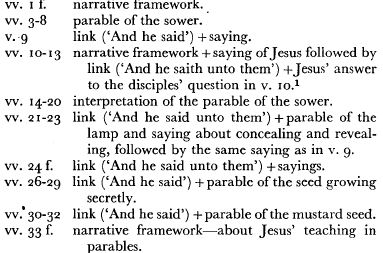Research Article
Thomas Halyburton1
-
- Published online by Cambridge University Press:
- 02 February 2009, pp. 1-13
-
- Article
- Export citation
The Relevance of the Old Testament for the Doctrine of the Church
-
- Published online by Cambridge University Press:
- 02 February 2009, pp. 14-23
-
- Article
- Export citation
The Nature of Truth
-
- Published online by Cambridge University Press:
- 02 February 2009, pp. 24-28
-
- Article
- Export citation
Baptism — Is Missionary Practice Inconsistent?
-
- Published online by Cambridge University Press:
- 02 February 2009, pp. 29-35
-
- Article
- Export citation
Nomos: The Biblical Significance of Law
-
- Published online by Cambridge University Press:
- 02 February 2009, pp. 36-48
-
- Article
- Export citation
St. Mark 4.1–34
-
- Published online by Cambridge University Press:
- 02 February 2009, pp. 49-66
-
- Article
- Export citation
Book Reviews
The Christian Challenge to Philosophy. By W. H. V. Reade. S.P.C.K pp. xiii + 195. 13s. 6d.
-
- Published online by Cambridge University Press:
- 02 February 2009, pp. 67-69
-
- Article
- Export citation
The Epistle to Diognetus: The Greek Text with Introduction, Translation and Notes. By H. G. Meecham, D.D., Principal of Hartley Victoria College Manchester. Manchester University Press, 1949. pp. 165. 18s. net.
-
- Published online by Cambridge University Press:
- 02 February 2009, pp. 69-70
-
- Article
- Export citation
John Cassian. A Study in Primitive Monasticism. By Owen Chadwick. Cambridge University Press. 15s.
-
- Published online by Cambridge University Press:
- 02 February 2009, pp. 70-71
-
- Article
- Export citation
Letters of Herbert Hensley Henson. Chosen and Edited by Evelyn Foley Braley. S.P.C.K.1950. pp. xvi + 255. 15s.
-
- Published online by Cambridge University Press:
- 02 February 2009, pp. 71-74
-
- Article
- Export citation
Two Religions. A comparative Study of some distinctive Ideas and Ideals in Hinduism and Christianity: being the Croall Lectures for 1948. By John Mackenzie, C.I.E., D.D. Lutterworth Press. 7s. 6d.
-
- Published online by Cambridge University Press:
- 02 February 2009, pp. 74-75
-
- Article
- Export citation
The New Testament against its Environment. By Floyd V. Filson. Student Christian Movement Press. 6s.
-
- Published online by Cambridge University Press:
- 02 February 2009, pp. 76-78
-
- Article
- Export citation
The Doctrine of the Atonement. By Leonard Hodgson. Nisbet. ios. 6d.
-
- Published online by Cambridge University Press:
- 02 February 2009, pp. 78-80
-
- Article
- Export citation
Natural Science and the Spiritual Life. By John Baillie. Oxford University Press, 1951. pp. 43. 5s.
-
- Published online by Cambridge University Press:
- 02 February 2009, pp. 80-81
-
- Article
- Export citation
Reformed Dogmatics, set out and illustrated from the sources, by Heinrich Heppe. English translation by G. T. Thomson. Allen and Unwin Ltd. 50s.
-
- Published online by Cambridge University Press:
- 02 February 2009, pp. 81-85
-
- Article
- Export citation
The Earliest Christian Confessions. By Oscar Cullmann. Translation by J. K. S. Reid. Lutterworth Press. 4s. 6d.
-
- Published online by Cambridge University Press:
- 02 February 2009, pp. 85-87
-
- Article
- Export citation
Christianity on the Frontier. By John A. Mackay. Lutterworth Press. 8s. 6d.
-
- Published online by Cambridge University Press:
- 02 February 2009, pp. 87-89
-
- Article
- Export citation
A Manual of Doctrine. By J. M. Bates. Presbyterian Bookroom, Christchurch and Dunedin. 9s. 6d.
-
- Published online by Cambridge University Press:
- 02 February 2009, pp. 89-90
-
- Article
- Export citation
The Fulness of Christ. The Church's Growth into Catholicity: being a report presented to His Grace the Archbishop of Canterbury, with a foreword by the Archbishop of Canterbury. S.P.C.K. 3s. 6d.
-
- Published online by Cambridge University Press:
- 02 February 2009, pp. 90-100
-
- Article
- Export citation
Intercommunion—Report of a Theological Commission of Faith and Order. S.C.M. Press. 2S.
-
- Published online by Cambridge University Press:
- 02 February 2009, pp. 100-106
-
- Article
- Export citation

